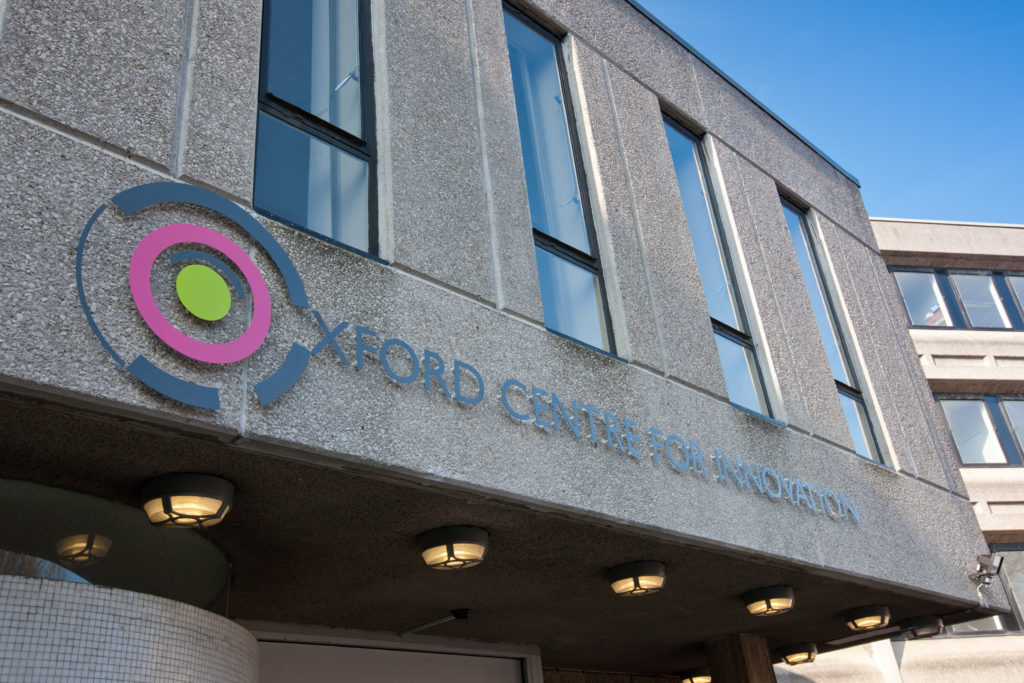The Wood Centre for Innovation. Pic: The Oxford Trust/Ed Nix
How The Oxford Trust provides ‘flexible certainty’ for growing science and tech firms
Even pre-Covid, growing companies were faced with the question of whether to lease or licence offices, what type of accommodation they needed, and the support and network the space gave access to. Now, in this fluid environment, companies need more flexibility when it comes to choosing accommodation. The Oxford Trust runs two innovations centres in Oxford, and the range of space and support on offer is designed for start-ups and scale-up firms in tech and science sectors.
To be clear, taking on a lease is a long-term debt on a company’s balance sheet and, just like a mortgage, it is not easy to get out of without high costs. By their nature, leases are inflexible, with the certainty going to the landlord and, so long as they remain solvent, the risk largely lying with the client. On the other hand, licensing usually comes at a higher up-front cost, but has limited liabilities on the client side, as most of the risks lie with the facility’s owner.
If a company is well-established, has a large spatial requirement, usually north of 5,000 sq ft, and is economically stable, then long-term planning would indicate a lease to be the logical step. If one or more of these factors don’t apply, then in my view taking a lease should be approached with caution, especially in the post Covid-19 uncertainty.
For a start-up company, or one just starting to grow, the add-on costs of leases, together with the balance sheet impairment investors look closely at, can be significant. Covering business rates, utilities, building maintenance, IT, administration and so forth comes at a price, which often surprises many first-time leaseholders. And being stuck until the break point in the lease, no matter what happens to the company’s own business environment, is something to be seriously considered.
With license-based options the headline rate is always higher because the operating costs are (normally) included along with reception services, post room etc. Equally, there are no long-term commitments, ie debts. So if a business changes, it can contract or grow without the liabilities of a lease.
At at time when we are all re-assessing daily life and what is important for employees and business, having the flexible certainty of a well-structured license from a provider which is used to this business model can often be the best way to proceed. That way, when stability returns, a company can then move on to longer term commitments.
The Oxford Trust addressed the dilemma of whether to lease or license premises some 30 years ago, when it initiated a licensing-to-lease model was in its – and Europe’s – first innovation centre for science and tech start-ups. The scheme is still on offer at the Trust’s Wood Centre for Innovation.
A notable characteristic of the Covid-19 situation is a reassessment by companies of what is important to them and their employees when it comes to space. The pandemic has highlighted that enhanced flexibility and shaping of the workplace is likely to be the key to survival, especially at the early stages of company development.
Attitudes and expectations of employees are transforming. Many are getting used to working from home, adopting systems such as Zoom and MS Teams, and just as many again want to get out of the home, craving more social contact.
For The Oxford Trust it is simply no longer just about our innovation centres providing a desk, maximising employee density and offering breakout spaces, but about enhancing the experience to create places employees want to come to, and not somewhere they have have to go to.
For firms looking for space, unique office and lab environments with health and wellbeing in mind, are an important part of attracting and retaining future talent, as well as supporting informal meetings, social events that encourage wider collaboration and, hopefully, spark greater innovation.
The Trust’s new centre, The Wood Centre for Innovation, in Oxford’s Global Health & Life Sciences District, and pictured above, was designed with all these facets in mind, as described in its latest film.
Its air source heat pumps for heating and natural ventilation for cooling, are suddenly nearer the top of occupiers’ wish lists, along with the wellness programmes, acres of natural realm, outdoor decking and space for outdoor meetings. The newly-opened Barclays Eagle Lab substantially boosts the centre’s ability for agile working, adding to social and professional potential through events, co-working, and networking.
What type of business support is included is increasingly important, and companies should check whether support is included and is it provided free. Both innovation centres offer business support as standard to client companies through managing agents Oxford Innovation (OI). This comes in the form of one-to-one support, making connections and linking to opportunities, and events and seminars to make sure businesses have the right skills to expand and grow. OI’s Innovation Director, Wendy Tindsley, has helped countless companies with grants, funding, tax and business infrastructure advice.

Oxford Centre for Innovation. Pic: The Oxford Trust
Early-stage tech companies have the opportunity to enter the Trust’s Escalator Support Programme, where eligible start-ups benefit from substantially reduced occupancy rates that slowly change over five years. In effect, companies joining the Trust’s centres in their first year of formation, at seed or pre-seed stages, can benefit from one full year of free accommodation.
As a charity, the Trust doesn’t have shareholders to pay. All surplus income is re-invested into enterprise support as well as STEM education and engagement programmes through Science Oxford.
For The Oxford Trust, it is all part of giving back to the innovation ecosystem that made its founders, Sir Martin and Lady Audrey Wood, so successful in their own ventures and investments. Companies such as Mirada Medical, Perspectum Diagnostics, Navenio, and many more have started in the Trust’s centres and gone onto great things.
